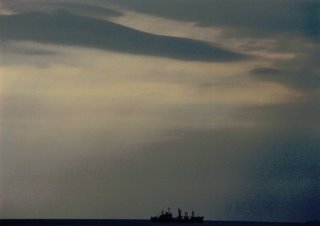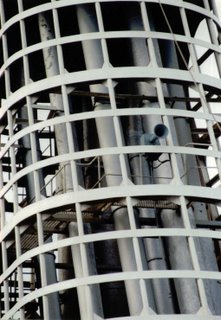On The China Sea
 Left: Silhouetted ship on the horizon of the China Sea, during twilight.
Left: Silhouetted ship on the horizon of the China Sea, during twilight.Photography by El-Branden Brazil
In 1998, a Chinese ferry service was offered from Osaka, Japan to Shanghai, China. I had become aware of it, when I watched Michael Palin's classic television series, Around The World In 80 Days, and thought that it would be fun to spend Christmas on the high seas, with my friend Jason.
The ticket was extremely cheap, costing only 30,000 yen ($300) return, but after the added charges for the shinkansen (the bullet train) from Tokyo to Osaka, as well as the hotel we stayed at, it quickly became apparent that an airplane flight to Shanghai would have cost the same. However, it was not the cost that was of concern, but the enticement of the sea. There seemed to be something very nostalgic and exotic about travelling to Shanghai by ship.
The ship was not at all luxurious. Tiny cabins were available, but we chose the shared dormitory, which was basically a large room with hard futon mats and pillows. The prospect of sharing space with some thirty snoring fellow passengers was not exactly ideal, but it would be an interesting experience, nonetheless.
After choosing our futons for the next two and a half days, we quickly befriended the only other Westerner on-board, a tall Swede, called Jonas, who was at the time a student in Kyoto. Very quickly, we discovered our new friend to be fine company.
Finally, the ship left Osaka harbour, and we started to embark on our sea adventure. For what seemed like forever, the coastline of Japan continued to accompany us, until finally two tiny islets that sit at the most southern tip of the Japanese archipelago, slowly faded into the distance.
The romance of sailing, soon gave way to the reality that there is very little to actually do out at sea. Wandering around the decks and staring out on the sometimes grey, sometimes green ocean, soon lost its appeal. As to be expected, the bar on-board soon became a haven for stimulation, as bottles and bottles of Tsingtao beer were downed with ease.
As the first night finally came, we stood out on the windy deck at the stern. The sea was quite choppy, but it was refreshing and exciting to be out
 there. It was a unique place to celebrate Christmas day, so Jason, Jonas and I decided to light up some cigars. Rather amusingly, none of us are smokers, and so after a few choking puffs, we threw the cigars into the ocean, relieved from further pollution. If only cigars tasted like they smell, I thought.
there. It was a unique place to celebrate Christmas day, so Jason, Jonas and I decided to light up some cigars. Rather amusingly, none of us are smokers, and so after a few choking puffs, we threw the cigars into the ocean, relieved from further pollution. If only cigars tasted like they smell, I thought.The second day was not a good one for Jonas. The seas were now particularly rough, and our vessel was bobbing up and down with irregular motion. I have travelled on many ships before, and I am lucky not to be someone who suffers from seasickness. In fact, I love it when the seas are rough. I remember when I travelled to Guernsey from the British mainland, on a terribly ferocious evening. Whilst I was running around loving every minute, a poor Catholic nun was one of many passengers suffering.
Out of the three of us, Jonas was the only one to succumb to violent seasickness, which was extraordinary, because he had been in the Swedish Navy for two years, doing national service! Just as he thought his stomach had settled, he had to rush back to the bathroom, often not reaching the appropriate spot on time. He suffered terribly.
In the evening, the storm subsided and Jonas's colour returned. Of course, beer consumption continued unabated.
By the next morning, the novelty for being out on the sea had now long passed, and we were all desperate to get back on land. I had always had a deep interest and curiosity about China, that went back to my childhood, so I was extremely excited to catch a glimpse of the land.
Finally, many Chinese boats and ships started to appear with more frequency, and then a spur of land came on to the horizon. We cruised slowly towards it. After what seemed like hours, we were very soon sailing into Shanghai harbour.
We disembarked, stepped out of immigration and on to the fascinating, polluted streets of one of the world's great cities, knowing that a return voyage was awaiting us at the end of the trip.



6 comments:
Great post. I remember in Palins Around the World in 80 days, the lack of stimulation was something that Michael also found out on one of the big ships. But I actually love it when such incidents come along when there is "nothing" around to escape into, and suddenly we are left alone with ourselves (hopefully not accompanied by seasickness) to simply live without stimulation. There is always that initial discomfort, but it soon settles into a wonderful sense of contentment. Same when the power goes out in a family house. Suddenly everyone is forced to appreciate the simple things again, and everybody starts talking about things more or reads a book via candlelight. One day when I've experienced all that needs to be, I'll move into a log cabin in a forest and just enjoy the simplicity of things even more (:D
I love hearing about your adventures! I'm afraid I am one of the people that suffers really badly with travel sicknes-sea sickness being the worst! Horrible feeling!
Glad you enjoyed the post, folks. As always, thank you for being bothered to take a peak at my tales from time to time. It is really appreciated.
No problem. Unfortunately, I won't be able to check your blog for a few months though. Going away. But it has been a pleasure :D
Good luck with your adventures in Russia! I look forward to hearing your reports.
Many thanks, Alexander!
stunning pic of the ship on the horizon!
Post a Comment